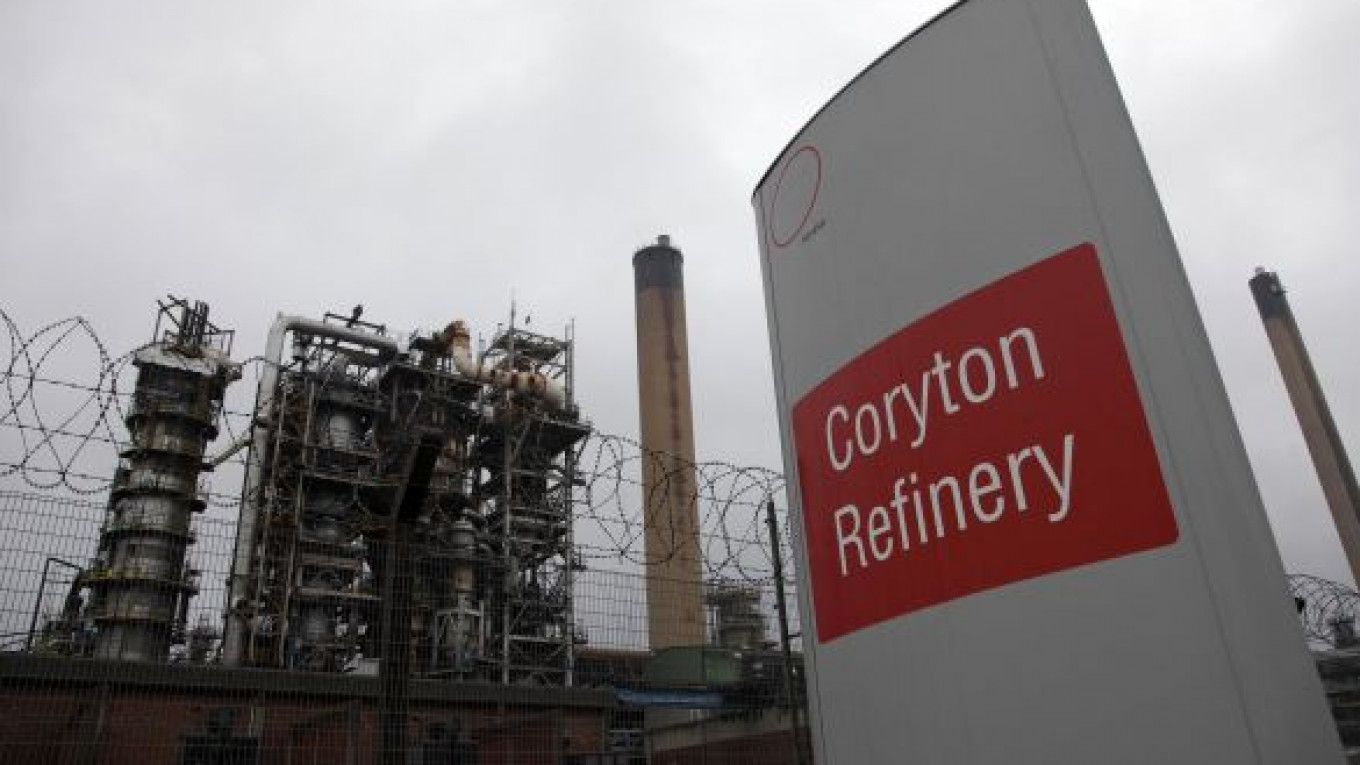A former energy minister has emerged as the sole bidder for a bankrupt British oil refinery, and controversy over his past deals with distressed assets may be overlooked in last-ditch efforts to rescue the plant and up to 900 jobs.
Igor Yusufov remains interested in buying the Coryton refinery in Essex, say people close to both sides of the talks.
The plant, a unit of bankrupt Swiss oil firm Petroplus, has run out of oil, and its workers will be laid off if no deal can be reached. Coryton is one of only seven working refineries in Britain.
Yusufov, who served as energy minister during Vladimir Putin’s first term as president, has faced questions about a past deal involving the purchase of a Norwegian shipyard group that he helped finance.
It subsequently failed, although before it went bankrupt, some assets were transferred offshore in a transaction deemed illegal by the official receiver. The group’s former owner died in a shooting last year that remains unsolved.
Yusufov’s investment vehicle, Fund Energy, the only bidder left seeking to operate Coryton as a refinery, has been asked by administrator PricewaterhouseCoopers to submit a best and final offer.
A spokeswoman for Britain’s Department of Energy and Climate Change said it is up to the administrator to secure a sustainable future for the plant. “The U.K. welcomes inward investment to our energy sector, but any bid for U.K. energy assets is, and would be, subject to the usual, rigorous scrutiny.”
Other potential bidders for the site would use it as a storage terminal, which would leave many more without jobs.
Yusufov was an energy adviser in the Kremlin under Dmitry Medvedev until April 2011. He is currently a director at Gazprom.
In 2008, he reportedly helped an associate, Andrei Burlakov, raise a 200 million euro ($250 million) loan to buy Norwegian shipbuilder Wadan Yards, which owned shipyards in Germany and Ukraine, in an attempt to turn the business around.
When that failed, Wadan was split up. Yusufov’s son, Vitaly, bought the German operations in a deal that Chancellor Angela Merkel backed to save jobs. She visited Medvedev to lobby for the 40.5 million euro sale, praising the Yusufovs as “seriously interested” investors.
Vitaly Yusufov had previously run the Moscow office of pipeline project Nord Stream, which is chaired by former German Chancellor Gerhard Schroeder. He moved the German shipyards into a new German-based firm, called Nordic Yards. They remain in operation.
The Ukrainian asset, the Okean Shipyard on the Black Sea coast, met with a more controversial fate.
Wadan Yards, the Norwegian parent company, was declared bankrupt in March 2010. Just before then, its shares in the Ukrainian yard, held through Dutch subsidiary Okean BV, were transferred to Blakur, based in the British Virgin Islands, according to official receiver Johan Ratvik of DLA Piper Norway.
In a December 2010 letter, Ratvik said that he viewed this share transfer as illegal because it took place after bankruptcy proceedings had opened, and that it should be revoked and investigated as a criminal act by the Norwegian police.
No investigation was launched.
He wrote that Igor Shaposhnikov, chairman of Wadan and Okean at the time of the deal, was criminally responsible. Shaposhnikov was fired in late 2010 after Okean was acquired from the receiver by Kostyantin Zhevago, a Ukrainian metals and mining magnate.
The alleged asset-stripping is now the subject of a Dutch court case in which Zhevago, who still owns Okean, is trying to recover the assets. A writ issued by Okean in April names Blakur and a number of other offshore companies among the defendants. The writ does not name the Yusufovs. The case comes to court in September.
Burlakov, the associate who was helped by Yusufov to finance the 2008 takeover of Wadan, stated after the shipyard’s collapse that Yusufov had been in effective control of the business all along, an allegation denied by Vitaly Yusufov.
Burlakov and his former partner, a banker called Anna Etkina, were held in Russia in late 2009 in an investigation into whether they had misappropriated funds to pay for the shipyard deal. They were released separately on bail in 2010 and went on to allege in summer 2011 that Igor Yusufov, not Burlakov, had been the beneficial owner of the Wadan Yards group.
Burlakov, who suffered from a coronary condition, was shot on Sept. 29, 2011 in a Moscow restaurant by an unknown assailant with a pistol that shoots rubber bullets. These are sometimes used to deliver warnings in criminal disputes. Burlakov died of a heart attack. Etkina, who was with him, was wounded after being shot in the head and chest.
Vladislav Tkachenko, Etkina’s legal representative, said she was shot after testifying that Igor Yusufov still controlled the Ukrainian shipyard assets.
Igor Yusufov has kept silent in public. Vitaly Yusufov has denied that his father was the ultimate owner of Wadan Yards and dismissed allegations of wrongdoing.
A Message from The Moscow Times:
Dear readers,
We are facing unprecedented challenges. Russia's Prosecutor General's Office has designated The Moscow Times as an "undesirable" organization, criminalizing our work and putting our staff at risk of prosecution. This follows our earlier unjust labeling as a "foreign agent."
These actions are direct attempts to silence independent journalism in Russia. The authorities claim our work "discredits the decisions of the Russian leadership." We see things differently: we strive to provide accurate, unbiased reporting on Russia.
We, the journalists of The Moscow Times, refuse to be silenced. But to continue our work, we need your help.
Your support, no matter how small, makes a world of difference. If you can, please support us monthly starting from just $2. It's quick to set up, and every contribution makes a significant impact.
By supporting The Moscow Times, you're defending open, independent journalism in the face of repression. Thank you for standing with us.
Remind me later.






